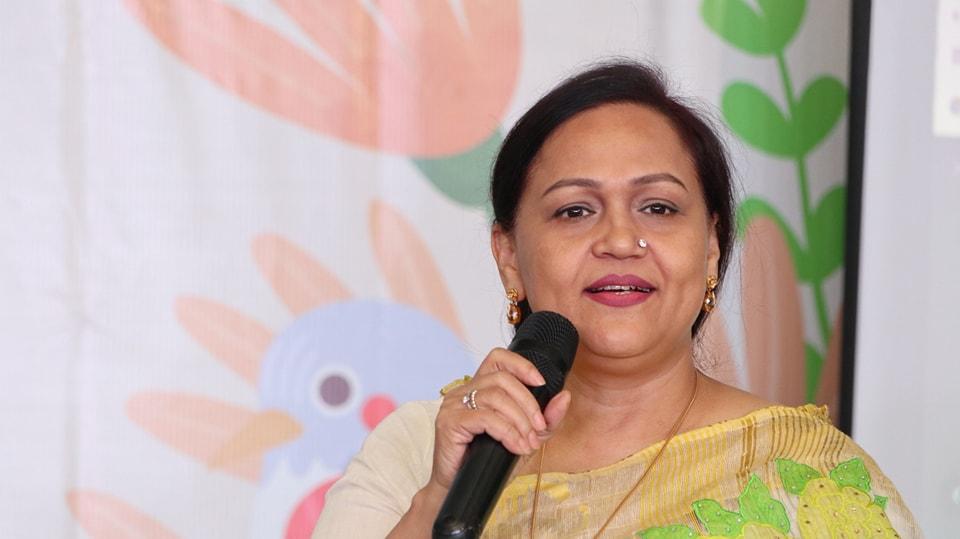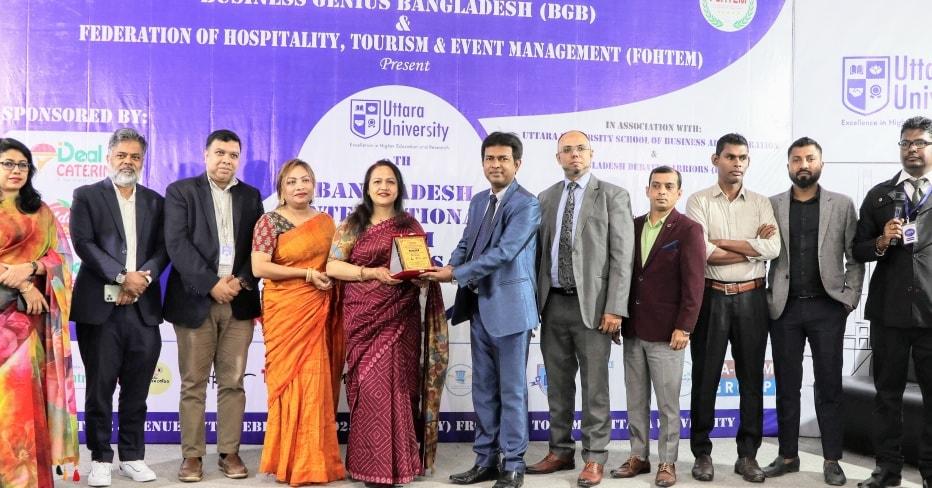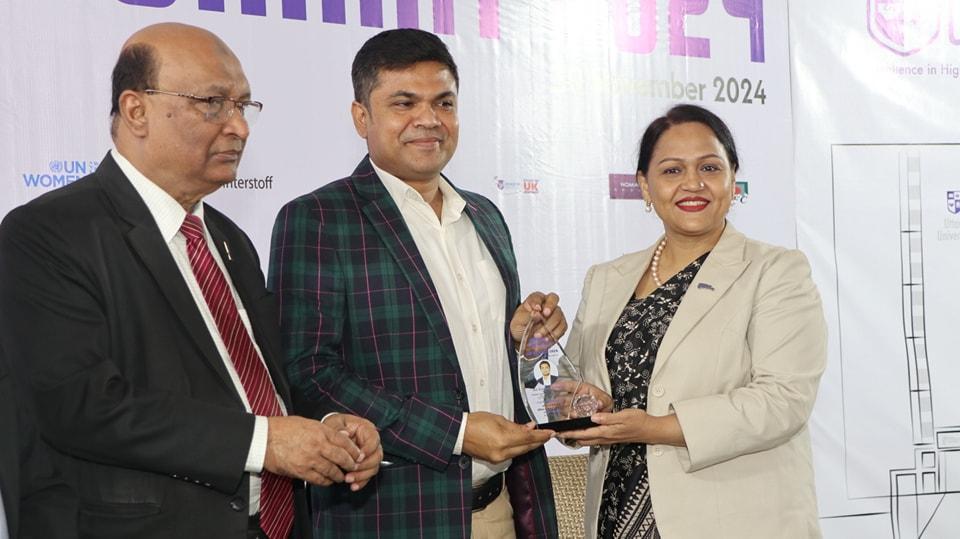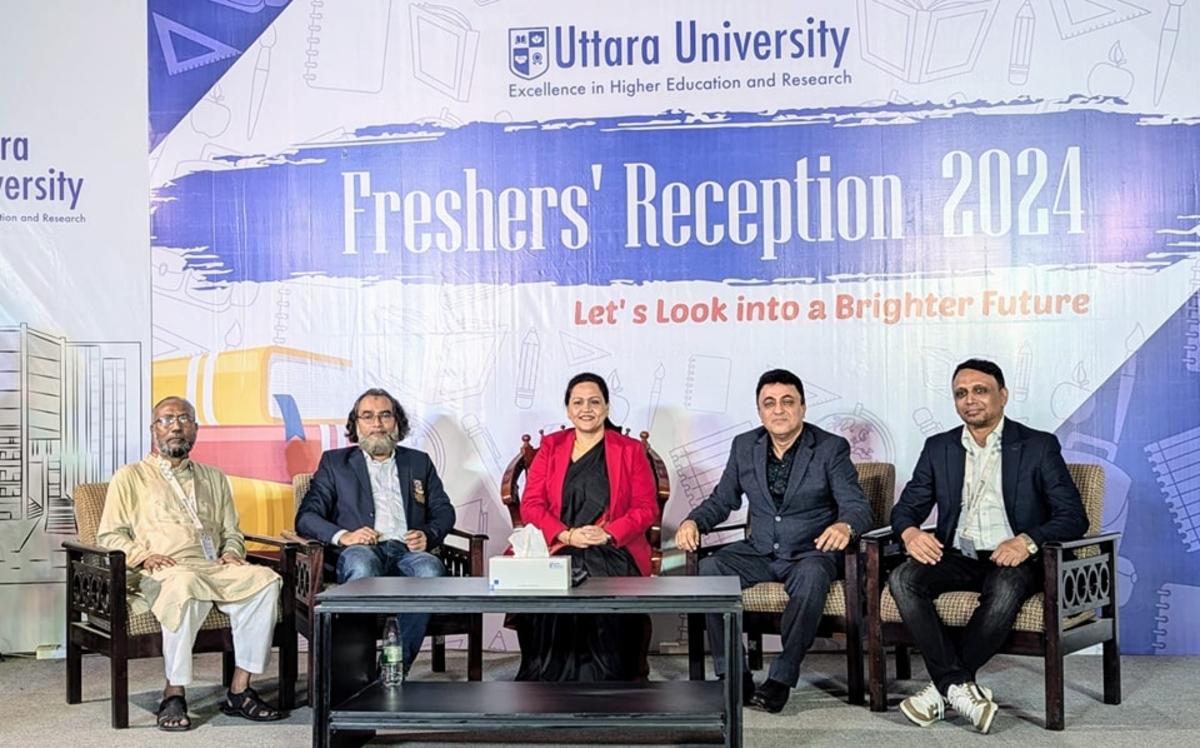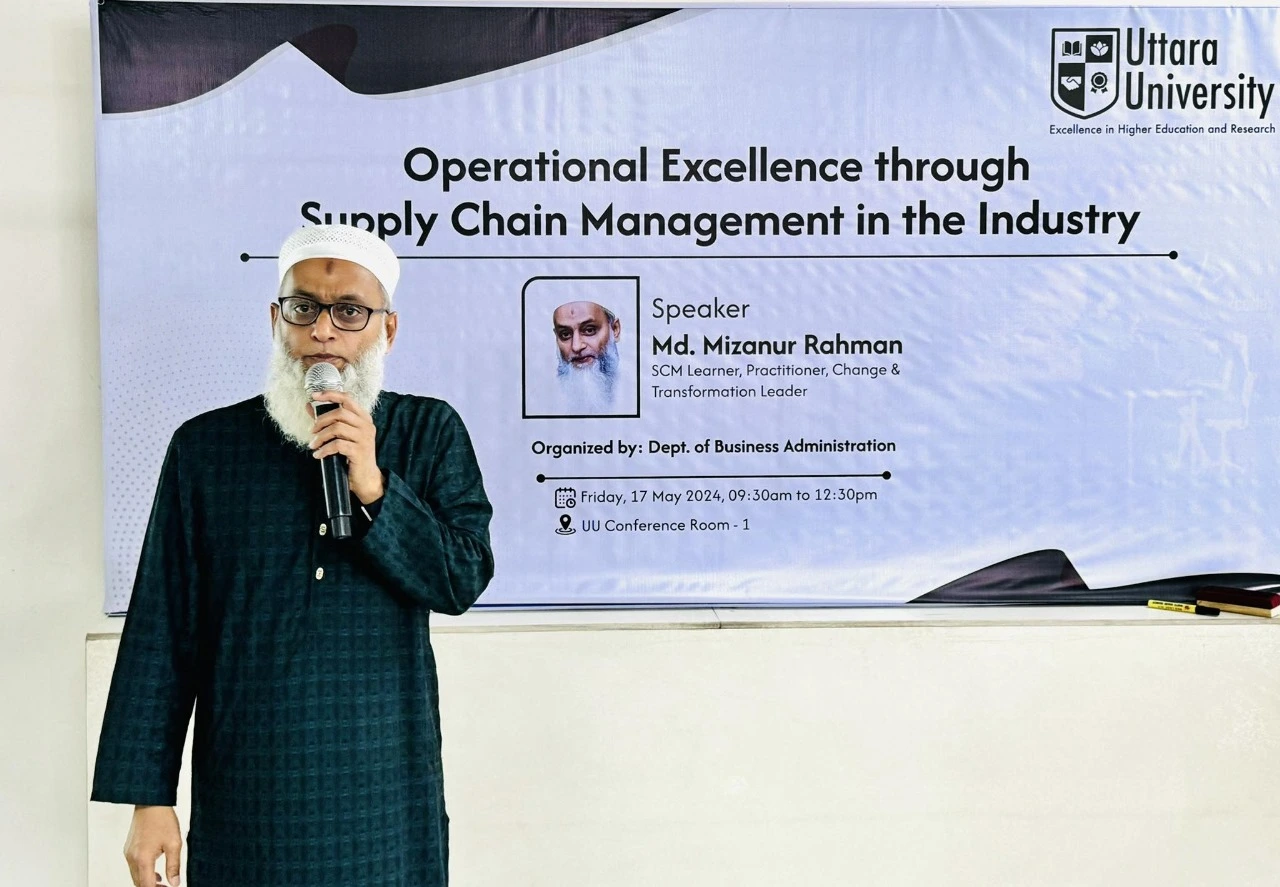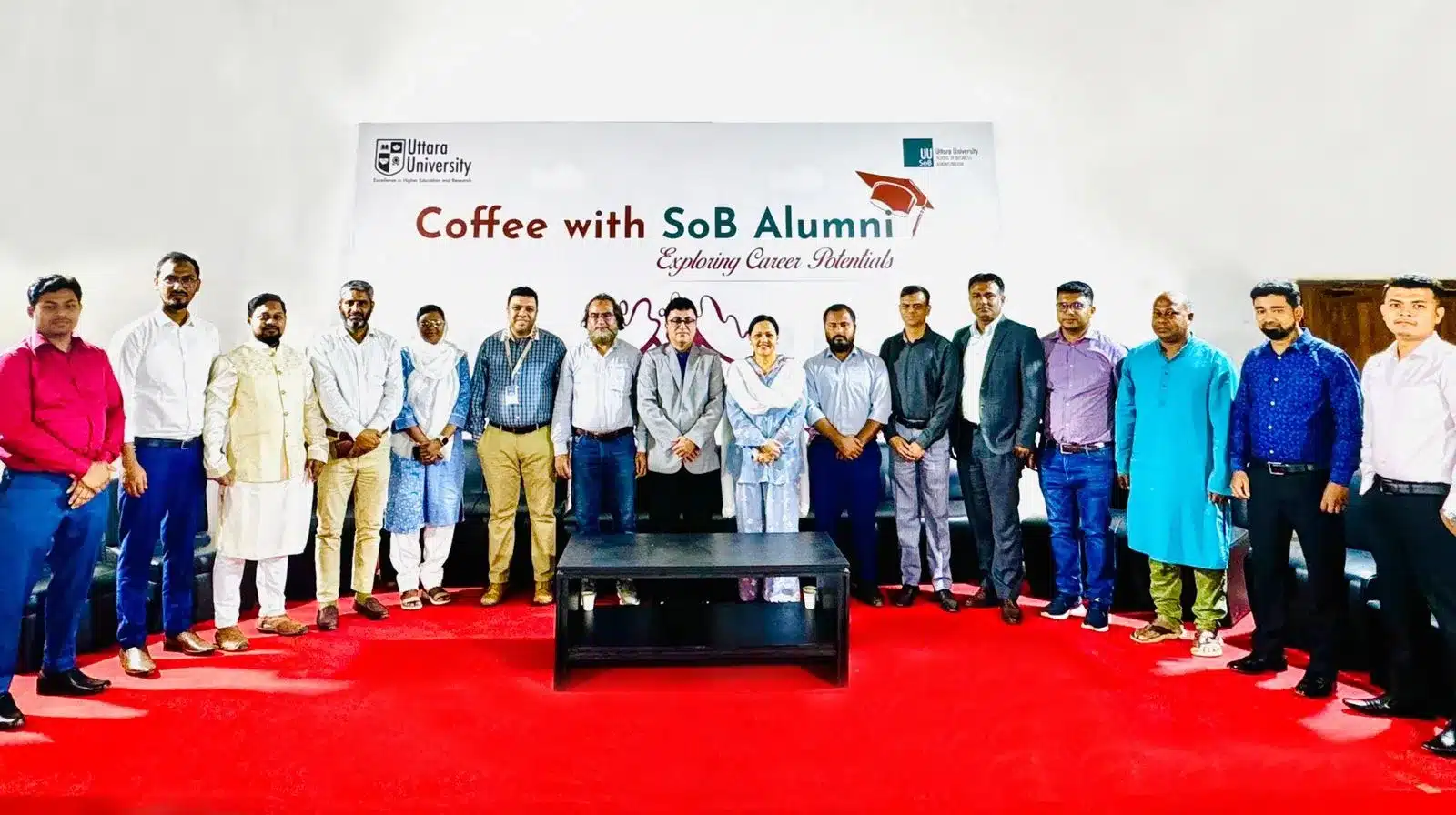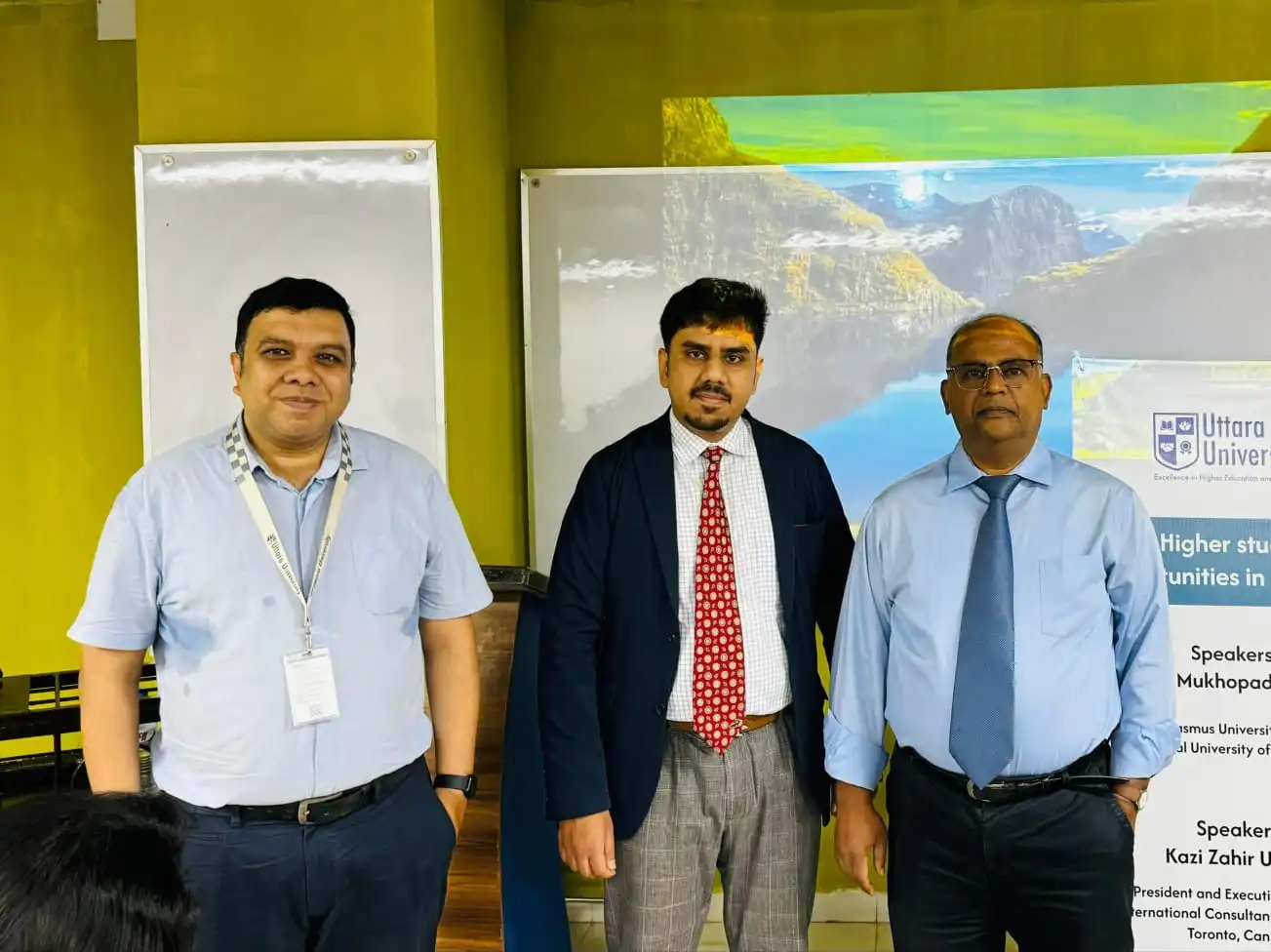Department of Business Administration

MBA Director’s Message
The business world is becoming increasingly global, and business education is reflecting this trend. Business education is evolving rapidly to keep pace with the changing needs of the business world and the broader society. I am honored to introduce Uttara University’s MBA and EMBA Programs, with a steadfast objective of forming responsible leaders.
In addition to having a solid grasp of business technology, UU MBA and EMBA students also possess strong leadership and communication abilities, a profound understanding of social responsibility and ethics, and a global perspective.
Our MBA and EMBA programs are tailored to meet the diverse requirements and goals of our learners. Our curriculum is regularly updated to provide our students with the skills, knowledge, and mindset needed to thrive in the modern global market. As our instructors stay current with industry developments, they often adapt the course material and delivery to the unique requirements of various business sectors, bringing a wealth of expertise and knowledge to the classroom.
The UU MBA and EMBA programs emphasize the overall development of students while fostering teamwork, creativity, and personal growth. To help our students learn and gain life experiences, we encourage participation in extracurricular activities, training, and other out-of-school programs. Through group learning, students gain a deeper understanding of their classmates, which paves the way for their comprehension of the emotional domain. Our state-of-the-art facilities, which rank among the best in Bangladesh for business schools, are designed to foster intellectual development, social connection, and professional advancement in a nurturing learning environment.
We are also proud of our network of alumni who work for reputable organizations across various industries. They serve as a testament to the quality of education and preparation our students receive at our institution.
I would like to extend an invitation to you to enroll in the UU MBA and EMBA Programs. We are excited to work with you to help you achieve your professional goals.
Join the UU MBA and EMBA Programs to change your future.
Dr. Mohammad Zahidul Islam
Assistant Professor & Director
MBA & EMBA Program, School Of Business
Uttara University

BBA Director’s Message
Our BBA programs are tailored to create business managers and leaders who can excel in various challenging roles in both national and international work environments. We nurture an ecosystem of student-centric and industry-focused curricula and teaching methods. Thus, the curriculum is compatible with global business education systems and customized to meet the nation's needs.
Additionally, our programs aim to equip our graduates with the latest business technologies and research tools to navigate global and regional digital business trends.
The School of Business at Uttara University employs competitive teaching methods to facilitate learning opportunities for our students. The faculty members of the business school have diverse academic backgrounds and advanced degrees from institutions both at home and abroad. We also have a resourceful library with a wealth of printed books, eBooks, and journals to keep abreast of the latest developments in knowledge. Moreover, we strive to maintain a connection between industries and the business school, enhancing our students’ access to job markets. We focus on adding value to our students to increase their employability in the current job market. Lastly, this is a prominent school where students can learn and enjoy their time on campus.
Dr. Soeb Md Shoayeb Noman
Associate Professor and Director
BBA Program, School Of Business
Uttara University
Department Overview
In 2003, our university took a significant step forward in its commitment to providing cutting-edge education and preparing students for the rapidly evolving world of business by establishing the Department of Business Administration. With a vision to cultivate future leaders, innovators, and entrepreneurs, the department embarked on a journey that would shape the landscape of business education for years to come.
The Department of Business quickly gained recognition from its humble beginnings for its innovative curriculum, distinguished faculty, and commitment to excellence. Drawing upon the expertise of seasoned professionals and scholars, the department designed programs that combined theoretical knowledge with practical experience, equipping students with the skills and insights needed to thrive in the dynamic business environment. Along with classroom lectures, students participate in various co-curricular activities that help them develop skills crucial for succeeding in the job market and functioning as valuable members of society.
Offering a range of undergraduate and graduate programs, including Bachelor of Business Administration (BBA), Master of Business Administration (MBA), and Executive MBA, the department provides students with a comprehensive understanding of business principles and practices. Students develop essential skills in management, finance, marketing, operations, and strategic planning, preparing them for successful careers in diverse fields of business. As the years passed, the Department of Business Administration continued to expand its offerings through experiential learning opportunities, industry partnerships, and cutting-edge research initiatives, remaining steadfast in its mission to foster a culture of academic excellence, creativity, and ethical leadership.
One of the distinctive features of the Department of Business Administration is its Innovation and Incubation Lab, dedicated to fostering entrepreneurship and innovation among students. This lab serves as a hub for creativity, collaboration, and experimentation, providing students with resources, mentorship, and networking opportunities to turn their business ideas into viable ventures. Through workshops, seminars, and hands-on projects, students gain practical experience in business development, market analysis, product prototyping, and startup management, empowering them to become future leaders and innovators in the business world. Over the years, the Department of Business Administration has produced countless alumni who have gone on to make significant contributions to the business world, leading multinational corporations, launching successful startups, and driving innovation in their respective fields. Their success stands as a testament to the quality of education and mentorship provided by the department.
Today, as we continue to navigate the complexities of the modern business landscape, we remain committed to upholding the department's legacy of excellence, innovation, and leadership, ensuring that our students are prepared to meet the challenges and opportunities of the future head-on.
Vision
To be a leading business department of students’ preferred choice in the South Asian Region through high-quality business education, research excellence, and collaboration with national and international stakeholders.
Mission
- Offering business-related programs that will enrich the knowledge, skills, attitudes, and perspectives of our students to succeed in a highly competitive national and global marketplace.
- Using effective teaching and learning strategies in a blended learning environment and placing students in corporate settings for practical-based learning, internships, and preparing students for rapidly evolving business careers.
- Developing ethically conscious business and civic leaders who will be critical thinkers, socially responsible, and effective problem solvers.
- Motivating high-quality research that addresses real-world business issues.
- Conducting quality programs with relevant and reputable institutes and organizations for mutual benefits.
What expertise do we build up?
UU business school builds expertise across various domains crucial for success in the corporate world and beyond. Here are some key areas our school focuses on developing expertise:
Management and Leadership: UU business school cultivates leadership qualities and management skills essential for effectively leading teams and organizations. This includes strategic planning, decision-making, communication, conflict resolution, and team building.
Finance and Accounting: Our school gains an understanding of financial principles. Provide expertise in financial analysis, investment strategies, budgeting, risk management, and accounting principles necessary for sound financial decision-making.
Marketing and Brand Management: Our school develops expertise in the Marketing field, which involves understanding consumer behavior, market research, branding strategies, advertising, digital marketing, and product development. We equip students with the skills to create and implement effective marketing campaigns.
Entrepreneurship and Innovation: In the recent past, our school has been actively fostering an entrepreneurial mindset by providing expertise in identifying opportunities, developing business plans, and navigating the challenges of starting and growing a business. We are also focusing on promoting innovation and creativity.
Business Ethics and Corporate Social Responsibility (CSR): Ethics and CSR are integral parts of modern business practices. Our school emphasizes the importance of ethical decision-making, sustainability, corporate governance, and social responsibility in business operations. A new curriculum has been introduced focusing on this area.
Communication and Presentation Skills: Effective communication is crucial in business. Our school helps students develop strong communication skills, including public speaking, writing, negotiation, and interpersonal communication.
Objectives
The overall objectives of the Department of Business Administration are to develop the student’s intellectual capacity, executive personality, and managerial and entrepreneurial skills in a way that enables them to be leaders in different private and public sectors.
Unique selling points or distinguishing features
- A large number of faculty members have PhD degrees, experience working at overseas universities, and trained in foreign countries.
- Faculty members are highly student-friendly
- Weekend MBA program for executives
- OBE curriculum
- International Advisory Board
- Innovation and Incubation lab
- Monthly research colloquium for faculty development
Medium of Instruction
Uttara University offers all the courses of study primarily in English. Teachers provide instruction to students in the classroom in English. English is also widely used as a medium of communication among the faculties, students, and administrative officials.
Academic Programs
Graduate
1. Master of Business Administration (MBA) (2 years)
2. Executive Master of Business Administration (EMBA)
Undergraduate
Bachelor of Business Administration (BBA)
Description of the Undergraduate Program
Bachelor of Business Administration (BBA)
This is a 140-credit-hour program. We offer non-credit courses as well. There are a total of 45 courses in this program, including an internship/project. A viva voce is held at the end of each academic year. This program includes GED courses, business core courses, integrated (capstone), major, and minor courses. The program lasts for four years and prepares students for their desired fields in business. It helps students understand their rights and exercise them responsibly. The faculty members guide students toward becoming empowered individuals.
Why should you choose to study BBA at Uttara University?
There are several compelling reasons why a student might choose to pursue a Bachelor of Business Administration (BBA) program:
- A BBA program covers a wide range of business-related subjects such as accounting, finance, marketing, management, and Management Information Systems (MIS). This breadth of knowledge equips students with versatile skills that are applicable across various industries and sectors.
- A BBA degree opens doors to diverse career opportunities in fields such as finance, consulting, marketing, human resources, entrepreneurship, and more. Graduates can pursue roles in both corporate and non-profit organizations or even start their own businesses.
- BBA programs often emphasize practical learning experiences such as case studies, internships, group projects, and simulations. These hands-on experiences help students develop critical thinking, problem-solving, communication, and teamwork skills that are highly valued in the workplace.
- BBA programs provide students with opportunities to connect with industry professionals, alumni, and fellow students through networking events, guest lectures, career fairs, and internships. Building a strong professional network can lead to valuable mentorship relationships, job opportunities, and career advancement.
- In today's interconnected world, businesses operate on a global scale. Many BBA programs offer courses or study abroad opportunities that expose students to international business practices, cultures, and markets, preparing them for careers in a globalized economy.
- A BBA degree can serve as a solid foundation for further education, such as pursuing a Master of Business Administration (MBA) or other advanced degrees. BBA programs offer specialized tracks or concentrations that allow students to focus on specific areas of interest before pursuing graduate studies.
- Beyond academic and career-related benefits, a BBA program can contribute to students' personal and professional growth. It challenges them to think critically, adapt to change, and develop leadership qualities, ultimately preparing them to become ethical and responsible business leaders in society.
Overall, choosing a Bachelor of Business Administration program provides students with a solid foundation for a successful and rewarding career in the dynamic and ever-evolving world of business.
Program Educational Objectives
The educational objectives are to ensure that the graduates are fundamentally solid, practical, dependable, collaborative, and professional and four to five years after graduation. The successful graduates will be able to:
PEO1: identify, analyze, and solve problems and function as skilled managers to respond to changing environment in a social and global context;
PEO2: demonstrate professional and personal leadership in their workspace and the society and effective collaboration and communication in the dynamic/changing work environment and beyond;
PEO3: utilize formal and informal learning opportunities to maintain and enhance technical excellence and professional growth;
PEO4: enhance the commitment to the values of social responsibility, legal and ethical principles, and corporate governance as a global citizen;
PEO5: embed attitude and aptitude to adapt to dynamic business environment and lifelong learning skills;
PEO6: use state-of-the-art IT Tools for data analysis, documentation, and presentation of information in a meaningful manner.
Program Learning Outcomes (PLOs)
At the time of graduation students will achieve the ability to:
The educational objectives are to ensure that the graduates are fundamentally solid, practical, dependable, collaborative, and professional and four to five years after graduation. The successful graduates will be able to:
PLO1: recognize the need for and develop strong emotional, social, and modern technological aptitude and skills to be a lifelong learner;
PLO2: identify, formulate, and solve complex business problems by applying the acquired knowledge and skills;
PLO3: recognize ethical and professional responsibilities in economic, environmental, and societal contexts;
PLO4: apply acquired and new knowledge necessary for the professional attitudes using appropriate learning strategies and exhibit entrepreneurial skills, necessary to implement new business ideas innovatively;
PLO5: demonstrate professional and personal leadership in their workspace and the society and effective collaboration and communication in the work environment and beyond
Description of the Graduate Program
Difference: MBA vs EMBA
While both MBA and Executive MBA (EMBA) programs offer advanced education in business administration, they cater to different audiences, formats, and career objectives. MBA programs are ideal for early- to mid-career professionals seeking a comprehensive business education, while EMBA programs are tailored for experienced executives looking to enhance their leadership skills and advance their careers while continuing to work full-time.
The distinction between MBA and EMBA programs also lies in their target demographic. EMBA programs are tailored for seasoned professionals who have already attained managerial or leadership roles. Consequently, EMBA students are generally older than their counterparts in conventional MBA programs. This difference in target audience also influences the expectations regarding professional work experience for applicants to each program. EMBA programs stipulate a minimum of two years of professional experience as part of their admissions criteria, ensuring candidates possess a solid understanding of the professional realm and their potential roles within it. While MBA programs may not explicitly state such a requirement, they anticipate candidates to present minimum graduate-level educational experience, not mandatorily in the field of business. Both programs have differences in credit requirements for completion.
Master of Business Administration (MBA) (2 years)
This program consists of 64 credit hours and 20 courses, along with an internship/project. This program includes GED courses, business core courses, integrated (capstone) courses, and a major. The standard minimum duration of the program is 2 years. Students gain a higher level of expertise in the field of business by completing the program.
Why should you choose to study MBA at Uttara University?
Choosing to pursue an MBA program is a significant step toward advancing your career and leadership skills. Uttara University offers several advantages for MBA students that make it a strong contender for your choice. Here are some reasons why you should consider studying for an MBA at Uttara University:
Comprehensive OBE-based MBA Curriculum:
Uttara University’s MBA program is designed to provide a well-rounded education in business administration. The OBE-based curriculum covers essential areas like marketing, finance, human resources, and accounting, equipping students with the knowledge and skills needed to thrive in a dynamic business environment.
Experienced Faculty:
The MBA program is taught by experienced faculty members who have strong academic backgrounds and practical industry experience. Their expertise ensures that students not only learn theoretical concepts but also gain insights into how those concepts apply in real-world business scenarios.
Flexible Learning Options:
Uttara University understands the diverse needs of students, especially those who may be working professionals. The university offers flexible class schedules, including evening and weekend classes, allowing students to balance their work, personal life, and education seamlessly.
Focus on Practical Learning:
The MBA program emphasizes practical learning through case studies, group assignments, and internships. This hands-on approach helps students develop problem-solving skills, critical thinking, and leadership abilities, which are crucial for success in the business world.
Strong Industry Connections:
Uttara University has established strong ties with various industries and corporations, which can be highly beneficial for MBA students. These connections facilitate internships, workshops, and job placement opportunities, giving students exposure to the corporate world.
Affordable and Accessible:
The MBA program at Uttara University is competitively priced compared to many other private universities in Bangladesh, making it an attractive option for students seeking a high-quality education at a reasonable cost. Additionally, the university offers scholarships and financial aid to deserving students, further lowering the financial burden.
Networking Opportunities:
An MBA is as much about building connections as it is about gaining knowledge. Uttara University provides students with opportunities to network through events, seminars, and collaborations with professionals and industry experts. This network can be invaluable for career growth and entrepreneurship.
Career Support and Placement:
The university’s career services team actively supports MBA students by organizing career fairs and skill-building workshops, as well as providing guidance for job interviews and career planning. Uttara University has a good track record of MBA graduates securing placements in reputable companies.
Conducive Learning Environment:
The university offers a conducive and collaborative learning environment. With modern classrooms, a well-equipped library, and access to online resources, MBA students can stay up-to-date with the latest developments in business and management.
By choosing Uttara University for your MBA, you will gain access to a solid academic foundation, practical business skills, and an extensive network that can help you achieve your career goals. It is a well-rounded choice for both aspiring professionals and experienced individuals looking to advance their careers.
Guideline For Student
Marks Distribution
| Particulars | Marks |
|---|---|
| Class Attendance + Class Performance | 5% |
| Class Test + Assignment | 10% |
| Mid Term Examination | 25% |
| Semester Final Examination | 50% |
| Viva Voce | 10% |
| Total | 100% |
Admission Requirements (Undergraduate)
Bachelor of Business Administration (BBA)
Structure of the Curriculum
a) Duration of the program: Years: 04 Semester: 08
b) Total Class Weeks in a Year: 28 Weeks in a Year / 14 Weeks in a Semester
c) Minimum CGPA requirements for graduation: CGPA 2.5
d) Maximum Academic Year of Completion: (4+3) 7 Years
e) Admission Requirements: As per UGC rule, a student can be admitted into a BBA program if s/he has obtained a minimum GPA of 2.50 at both SSC and HSC levels separately; or, a student with a GPA of 2.0 at either level must have a total 6.0 points in combination. Admission tests are arranged by the School/Department or the university. The subject areas of the admission test include language & communication, mathematics, analytical ability,
f) Category of Courses:
| Sl. No. | Courses | No. of Courses | Credits | Time Required |
|---|---|---|---|---|
| 1. | General Education (GED) | 13 | 39 | |
| 2. | Business Core | 24 | 72 | |
| 3. | Elective/Major or Concentration (Each Major) | 4 | 12 | 4 Years |
| 3. | Free Elective /Minor | 2 | 6 | |
| 4. | Capstone | 1 | 3 | |
| 5. | Non-credit compulsory | 1 | ||
| 6. | Viva (each year @ 1 credit) | 4 | ||
| 7. | Internship/Project | 4 | ||
| Total | 45 | |||
Admission Requirements (Graduate)
Master of Business Administration (MBA) (2 years)
Structure of the Curriculum
a) Duration of the program: Years: 02 Semester: 04
b) Total Class Weeks in a Year: 28 Weeks in a Year / 14 Weeks in a Semester
c) Minimum CGPA requirements for graduation: CGPA 2.5
d) Maximum Academic Year of Completion: (2+2) 4 Years
e) Admission Requirements: A candidate must have completed three (3) years of Bachelor's degree from any reputed University or Colleges of home and abroad or two (2) years of Bachelor's degree with two (2) years of work experience. Admission tests are arranged by the School or Department or the University. The subject areas of the admission test include language, communication, mathematics, and analytical ability.
f) Category of Courses:
| Sl. No. | Courses | No. of Courses | Credits | Time Required |
|---|---|---|---|---|
| 1. | General Education (GED) | 3 | 9 | 2 Years |
| 2. | Business Core | 12 | 36 | |
| 3. | Elective/Major or Concentration (Each Major) | 4 | 12 | |
| 4. | Capstone | 1 | 3 | |
| 5. | Internship/Project | 4 | ||
| Total | 20 | 64 | ||
Executive Master of Business Administration (EMBA)
Structure of the Curriculum
a) Duration of the program: Years: 1.5 Semester: 03
b) Total Class Weeks in a Year: 28 Weeks in a Year / 14 Weeks in a Semester
c) Minimum CGPA requirements for graduation: CGPA 2.5
d) Maximum Academic Year of Completion: (1.5+2.5) 4 Years
e) Admission Requirements: A candidate must have completed either 16 years of schooling with at least two (2) years of work experience at the executive level or 14 years of schooling with at least four (4) years of work experience. Admission tests are arranged by the School or Department or the University. The subject areas of the admission test include language, communication, mathematics, and analytical ability.
f) Category of Courses:
| Sl. No. | Courses | No. of Courses | Credits | Time Required |
|---|---|---|---|---|
| 1. | General Education (GED) | 2 | 6 | 1 Year 6 Months |
| 2. | Business Core | 9 | 27 | |
| 3. | Elective/Major or Concentration (Each Major) | 4 | 12 | |
| 4. | Capstone | 1 | 3 | |
| 5. | Project | 4 | ||
| Total | 16 | 52 | ||
Courses of Bachelor of Business Administration (BBA)
Detailed Information on Core and Elective Courses
General Education Courses
| Course Code | Course Title | Credits |
|---|---|---|
| ENG0231112 | Basic English | 2 |
| ENG0231117 | Sessional of Basic English | 1 |
| MAT0541113 | Basic Mathematics | 3 |
| HIS0222114 | History of the Emergence of Bangladesh | 3 |
| CSE0611116 | Computer Fundamentals | 2 |
| CSE0611116 | Computer Fundamentals | 2 |
| CSE0611118 | Sessional of Computer Fundamentals | 1 |
| BNG0232123 | Bengali Language and Literature | 3 |
| ECO0311124 | Microeconomics | 3 |
| ENG0231125 | Advanced English | 2 |
| ENG0231127 | Sessional of Advanced English | 1 |
| MAT0541126 | Mathematics for Decision-Making | 3 |
| ECO0311213 | Macroeconomics | 3 |
| STA0542214 | Business Statistics-I | 3 |
| CSE0611216 | Computer Application in Business | 2 |
| CSE0611218 | Sessional of Computer Application in Business | 1 |
| HIS0222221 | Bangladesh Studies | 3 |
| STA0542223 | Business Statistics-II | 3 |
Business Core Courses
| Course Code | Course Title | Credits |
|---|---|---|
| BUS0410111 | Introduction to Business | 3 |
| ACN0411115 | Principles of Accounting | 3 |
| FIN0412121 | Principles of Finance | 3 |
| MGT0413122 | Principles of Management | 3 |
| BUS0415211 | Business Communication | 2 |
| BUS0415217 | Sessional of Business Communication | 1 |
| MKT0414212 | Principles of Marketing | 3 |
| ACN0411215 | Intermediate Accounting | 3 |
| MGT0413222 | Organizational Behavior | 3 |
| FIN0412224 | Financial Management | 3 |
| BUS0410225 | Legal Environment of Business | 3 |
| MKT0414226 | Marketing Management | 3 |
| BUS0410311 | Entrepreneurship Development | 3 |
| FIN0412312 | Banking and Insurance | 3 |
| ACN0411313 | Cost and Management Accounting | 3 |
| HRM0413314 | Human Resource Management | 3 |
| MIS0418315 | Management Information System | 3 |
| MKT0414316 | Supply Chain Management | 3 |
| MIS0418321 | E-Business | 3 |
| ACN0411322 | Auditing and Taxation | 3 |
| MIS0418323 | Technology and Innovations Management | 3 |
| FIN0412324 | Project Management | 3 |
| BUS0410411 | Business Research Methods | 3 |
| MGT0413412 | Production and Operations Management | 3 |
| BUS0410421 | Business Ethics | 3 |
| MGT0413422 | Strategic Management | 3 |
| VIV0410129 | VIVA-VOCE | 1 |
| VIV0410229 | VIVA-VOCE | 1 |
| VIV0410329 | VIVA-VOCE | 1 |
| VIV0410429 | VIVA-VOCE | 1 |
| INT0410438 / PRJ0410439 | Internship /Project | 4 |
Non-credit compulsory
| Course Code | Course Title | Credits |
|---|---|---|
| PSE0031423 | Professional Skills Enhancement |
Accounting Major Courses
| Course Code | Course Title | Credits |
|---|---|---|
| ACN0411431 | Advanced Financial Accounting | 3 |
| ACN0411432 | Advanced Cost and Management Accounting | 3 |
| ACN0411433 | Advanced Audit and Assurance | 3 |
| ACN0411434 | Advanced Taxation | 3 |
| ACN0411435 | Forensic Accounting | 2 |
| ACN0411436 | Contemporary Issues in Accounting | 1 |
| ACN0411437 | Accounting in Public Sector and Non-Government Organizations (NGOs) | 3 |
Finance Major Courses
| Course Code | Course Title | Credits |
|---|---|---|
| FIN0412431 | Investment Analysis and Portfolio Management | 3 |
| FIN0412432 | Bank Management | 3 |
| FIN0412433 | Capital Budgeting | 3 |
| FIN0412434 | Financial Markets and Institutions | 3 |
| FIN0412435 | Corporate Finance | 2 |
| FIN0412436 | Public Finance | 3 |
| FIN0412437 | International Financial Management | 3 |
Human Resource Management (HRM) Major Courses
| Course Code | Course Title | Credits |
|---|---|---|
| HRM0413431 | Human Resource Planning | 3 |
| HRM0413432 | Industrial Relations and Labor Law | 3 |
| HRM0413433 | Compensation Management | 3 |
| HRM0413434 | Training and Development | 3 |
| HRM0413435 | HR Audit and Compliance | 2 |
| HRM0413436 | Conflict and Negotiation | 3 |
| HRM0413437 | Performance and Reward System | 3 |
| HRM0413438 | Organization Structure and Design | 3 |
Marketing Major Courses
| Course Code | Course Title | Credits |
|---|---|---|
| MKT0414431 | Consumer Behavior | 3 |
| MKT0414432 | Marketing Research | 3 |
| MKT0414433 | Promotional Management and Strategy | 3 |
| MKT0414434 | Services Marketing | 3 |
| MKT0414435 | Export-Import Management | 2 |
| MKT0414436 | Customer Relationship Management | 3 |
| MKT0414437 | Marketing Analytics | 3 |
| MKT0414438 | Digital Marketing | 3 |
Management Information System (MIS) Major Courses
| Course Code | Course Title | Credits |
|---|---|---|
| MIS0418431 | Data Communication & Networking | 3 |
| MIS0418432 | Database Management Systems | 3 |
| MIS0418433 | Web Design and Development | 3 |
| MIS0418435 | Data Analytics | 3 |
| MIS0418436 | Networking and Operating System | 2 |
| MIS0418437 | Cyber Security and Maintenance | 3 |
| MKT0414438 | Digital Marketing | 3 |
Semester-wise Course Distribution
| Title | Details |
|---|---|
| Course Distribution | View |
Master of Business Administration (MBA) (2 years)
General Education Courses
| Course Code | Course Title | Credits |
|---|---|---|
| MAT0541513 | Business Mathematics | 3 |
| STA0542514 | Business Statistics | 1 |
| ECO0311522 | Economics | 3 |
Business Core Courses
| Course Code | Course Title | Credits |
|---|---|---|
| ACN0411512 | Principles of Accounting | 3 |
| FIN0412523 | Principles of Finance | 1 |
| BUS0415525 | Business Communication | 3 |
| MKT0414511 | Principles of Marketing | 3 |
| MGT0413521 | Management and Organizational Behavior | 3 |
| FIN0412612 | Financial Management | 3 |
| MKT0414614 | Marketing Management | 3 |
| ACN0411611 | Cost and Management Accounting | 3 |
| HRM0413613 | Human Resource Management | 3 |
| MIS0418515 | Fundamentals of MIS | 3 |
| MGT0413524 | Production and Operations Management | 3 |
| BUS0410615 | International Business Management | 3 |
| INT0410638? / PRJ0410639 | Internship /Project | 4 |
Capstone Course
| Course Code | Course Title | Credits |
|---|---|---|
| MGT0413621 | Strategic Management | 3 |
Accounting Major Courses
| Course Code | Course Title | Credits |
|---|---|---|
| ACN0411631 | Advanced Audit and Assurance | 3 |
| ACN0411632 | Advanced Taxation | 3 |
| ACN0411633 | Corporate Reporting | 3 |
| ACN0411634 | Forensic Accounting | 3 |
| ACN0411635 | Strategic Management Accounting | 3 |
| ACN0411636 | Contemporary Issues in Accounting | 3 |
| ACN0411637 | Accounting in Public Sector and Non-Government Organizations (NGOs) | 3 |
Finance Major Courses
| Course Code | Course Title | Credits |
|---|---|---|
| FIN0412631 | Investment Analysis and Portfolio Management | 3 |
| FIN0412632 | Financial Markets and Institutions | 3 |
| FIN0412633 | Corporate Finance | 3 |
| FIN0412634 | Working Capital Management | 3 |
| FIN0412635 | Financial Analysis and Control | 3 |
| FIN0412636 | Public Finance | 3 |
| FIN0412637 | International Financial Management | 3 |
Human Resource Management (HRM) Major Courses
| Course Code | Course Title | Credits |
|---|---|---|
| HRM0413631 | Industrial Relations and Labor Law | 3 |
| HRM0413632 | Compensation Management | 3 |
| HRM0413633 | HR Audit and Compliance | 3 |
| HRM0413634 | Conflict and Negotiation | 3 |
| HRM0413635 | Performance and Reward System | 3 |
| HRM0413636 | Organization Structure and Design | 3 |
| HRM0413637 | Strategic Human Resource Management | 3 |
| HRM0413638 | Change Management and HR Intervention | 3 |
Marketing Major Courses
| Course Code | Course Title | Credits |
|---|---|---|
| MKT0414631 | Consumer Behavior | 3 |
| MKT0414632 | Promotional Management and Strategy | 3 |
| MKT0414633 | Export-Import Management | 3 |
| MKT0414634 | Retail Management | 3 |
| MKT0414635 | Customer Relationship Management | 3 |
| MKT0414636 | Marketing Analytics | 3 |
| MKT0414637 | Brand Management | 3 |
| MKT0414638 | Digital Marketing | 3 |
Management Information System (MIS) Major Courses
| Course Code | Course Title | Credits |
|---|---|---|
| MIS0418631 | Data Communication | 3 |
| MIS0418632 | Web Design and Development | 3 |
| MIS0418633 | System Analysis and Business Modelling | 3 |
| MIS0418634 | Artificial Intelligence | 3 |
| MIS0418636 | Data Analytics | 3 |
| MIS0418637 | Cyber Security and Maintenance | 3 |
| MKT0414638 | Digital Marketing | 3 |
Semester-wise Course Distribution
| Title | Details |
|---|---|
| Course Distribution | View |
Executive Master of Business Administration (EMBA)
General Education Courses
| Course Code | Course Title | Credits |
|---|---|---|
| STA0542514 | Business Statistics | 1 |
| ECO0311522 | Economics | 3 |
Business Core Courses
| Course Code | Course Title | Credits |
|---|---|---|
| FIN0412523 | Principles of Finance | 1 |
| BUS0415525 | Business Communication | 3 |
| MGT0413521 | Management and Organizational Behavior | 3 |
| FIN0412612 | Financial Management | 3 |
| MKT0414614 | Marketing Management | 3 |
| ACN0411611 | Cost and Management Accounting | 3 |
| HRM0413613 | Human Resource Management | 3 |
| MGT0413524 | Production and Operations Management | 3 |
| BUS0410615 | International Business Management | 3 |
| PRJ0410639 | Project | 4 |
Capstone Course
| Course Code | Course Title | Credits |
|---|---|---|
| MGT0413621 | Strategic Management | 3 |
Accounting Major Courses
| Course Code | Course Title | Credits |
|---|---|---|
| ACN0411631 | Advanced Audit and Assurance | 3 |
| ACN0411632 | Advanced Taxation | 3 |
| ACN0411633 | Corporate Reporting | 3 |
| ACN0411634 | Forensic Accounting | 3 |
| ACN0411635 | Strategic Management Accounting | 3 |
| ACN0411636 | Contemporary Issues in Accounting | 3 |
| ACN0411637 | Accounting in Public Sector and Non-Government Organizations (NGOs) | 3 |
Finance Major Courses
| Course Code | Course Title | Credits |
|---|---|---|
| FIN0412631 | Investment Analysis and Portfolio Management | 3 |
| FIN0412632 | Financial Markets and Institutions | 3 |
| FIN0412633 | Corporate Finance | 3 |
| FIN0412634 | Working Capital Management | 3 |
| FIN0412635 | Financial Analysis and Control | 3 |
| FIN0412636 | Public Finance | 3 |
| FIN0412637 | International Financial Management | 3 |
Human Resource Management (HRM) Major Courses
| Course Code | Course Title | Credits |
|---|---|---|
| HRM0413631 | Industrial Relations and Labor Law | 3 |
| HRM0413632 | Compensation Management | 3 |
| HRM0413633 | HR Audit and Compliance | 3 |
| HRM0413634 | Conflict and Negotiation | 3 |
| HRM0413635 | Performance and Reward System | 3 |
| HRM0413636 | Organization Structure and Design | 3 |
| HRM0413637 | Strategic Human Resource Management | 3 |
| HRM0413638 | Change Management and HR Intervention | 3 |
Marketing Major Courses
| Course Code | Course Title | Credits |
|---|---|---|
| MKT0414631 | Consumer Behavior | 3 |
| MKT0414632 | Promotional Management and Strategy | 3 |
| MKT0414633 | Export-Import Management | 3 |
| MKT0414634 | Retail Management | 3 |
| MKT0414635 | Customer Relationship Management | 3 |
| MKT0414636 | Marketing Analytics | 3 |
| MKT0414637 | Brand Management | 3 |
| MKT0414638 | Digital Marketing | 3 |
Management Information System (MIS) Major Courses
| Course Code | Course Title | Credits |
|---|---|---|
| MIS0418631 | Data Communication | 3 |
| MIS0418632 | Web Design and Development | 3 |
| MIS0418633 | System Analysis and Business Modelling | 3 |
| MIS0418634 | Artificial Intelligence | 3 |
| MIS0418636 | Data Analytics | 3 |
| MIS0418637 | Cyber Security and Maintenance | 3 |
| MKT0414638 | Digital Marketing | 3 |
Semester-wise Course Distribution
| Title | Details |
|---|---|
| Course Distribution | View |
Research Projects
| Sl No. | Project title | Project ID | Session/ Year | Name of the Faculty Member | Designation | Status (Completed/ Ongoing) |
|---|---|---|---|---|---|---|
| 1 | Impact of Internal Environmental Factors on Private Commercial Banks’ Performance in Bangladesh | P-24(CRT 2019) | 2019-20 | Nusrat Jahan | Assistant Professor | Completed |
| 2 | Human Resource Competency in the Bangladeshi Banking Sector: A Cross-sectional Study | P-1/SoB-1/CRT 2023 | 2023-2024 | Rashed Mahmud Shakil | Assistant Professor | Ongoing |
| 3 | Impact of Intrinsic and Extrinsic Motivation on Academic Performance of the Students at Private Universities of Bangladesh | P-3/SoB-3/CRT 2023 | Dr. Serena Aktar | Assistant Professor | Ongoing | |
| 4 | The Influence of Corporate Governance on Corruption Disclosure in the Financial Sector: An Empirical Study | P-10 (CRT 2020) | 2022-2023 | Mohammad Sharif Hossain | Assistant Professor | Completed |
| 5 | Developing an Integrative Customer Satisfaction Model: An Application of Customer Experience in Bangladesh E-Banking Services | P-36/SoB-6/CRT 2023 | 2023-2024 | Dr. Md. Golam Morshed | Assistant Professor | Ongoing |
| 6 | Anticipating the Financial Distress of Textile Industry in Bangladesh: An Empirical Analysis on Listed Companies in Dhaka Stock Exchange (DSE) | N/A (1st session of CRT, UU) | 2018-2019 | Sonia Rezina | Assistant Professor | Completed |
| 7 | Impact of Internal Environmental Factors on Private Commercial Banks’ Performance in Bangladesh | P-24 (CRT 2019) | 2019-2020 | Sonia Rezina | Assistant Professor | Completed |
| 8 | Impact of TQM on Organizational Performance of the RMG Sector in Bangladesh | P-2 (CRT 2019) | 2019-2020 | Sonia Rezina | Assistant Professor | Completed |
| 9 | Anti-Smoking Role of Unmarried Female Students through Spousal Selection Behavior | P-8/BS-2/CRT 2019 | 2019-2020 | Dr. ASM Shahabuddin | Professor | Completed |
| 10 | Anti-Smoking Role of Unmarried Female Students through Spousal Selection Behavior | P-8/BS-2/CRT 2019 | 2019-2020 | Dr. Soeb Md. Shoayeb Noman | Assistant Professor | Completed |
| 11 | Impact of TQM on Organizational Performance of the RMG Sector in Bangladesh | P-2 (CRT 2019) | 2019-2020 | Afrida Akhter Tithi | Senior Lecturer | Completed |
| 12 | Impact of TQM on Organizational Performance of the RMG Sector in Bangladesh | P-2 (CRT 2019) | 2019-2020 | Farhana Mitu | Assistant Professor | Completed |
Resources
| Title | Details |
|---|---|
| Thesis Forms Example | View |
Co-curricular Clubs
Business Club
The Uttara University Business Club provides a platform that enables our youth, the future leaders, to prepare for their professional careers. The club organizes frequent career development events, workshops, seminars, and competitions that broaden their horizon of knowledge and help them sharpen their interpersonal, leadership, and networking skills to a great extent.
Departmental Committees
- Program Self Assessment Committee
- Exam Committee
- Question Moderation Committee
- Credit Transfer Assessment Committee
The Innovation and Incubation Lab (IIL)
The Innovation and Incubation Lab (IIL) under Support Actions for Self-Employment Endeavours (SEE) at the School of Business of Uttara Universityserves as a hub for fostering collaboration with industry, a platform for nurturing new ideas, conducting research, and supporting entrepreneurs in pursuing innovative solutions. The establishment of the “Innovation and Incubation Lab (IIL)” radically differs by its primary focus on demonstrating our graduate entrepreneurs as role models for current students. Thus, potential student entrepreneurs can benefit from direct, practical mentoring support offered by these successful entrepreneurs.
Aims and Objectives
- To increase the percentage of existing students with entrepreneurial intentions.
- To connect the potential student entrepreneurs to real-life entrepreneurs.
- To engage existing students in gaining valuable experiences that are instrumental for pursuing an entrepreneurial career in the future.
- To establish industry-academia connections and partnerships to stimulate the entrepreneurial spirit among the existing students.
- To create collaborative research opportunities with young leading entrepreneurs.
Activities
- Arrange skill development workshops and seminars.
- Offers entrepreneurial workshops and virtual platforms for startup consultancy.
- Come up with event-specific publications having entrepreneurial content.
- Arranges colloquiums/discussion sessions on published/ongoing research papers on Entrepreneurship by the UU faculty members and students.
- Showcases the track record of both the current student entrepreneurs and graduate entrepreneurs of UU to inspire the existing students.
Highlights of notable alumni and their achievements
1. Suman Chandra Das
Suman Chandra Das earned his BBA (Batch 19th), majoring in finance, from the Department of Business Administration, the School of Business at Uttara University. In 2013, he was a regular student in Batch 19. He received the Dean's Award and the Summa Cum Laude Award. He was an incredibly sincere student. He received a scholarship from Uttara University during the admissions period, saving him 40% on his tuition. He fully managed his tuition costs using his scholarship money in addition to engaging in activities like home tuition and coaching classes. Now, he is working as an assistant director of the Bangladesh Bank. The competition attracted approximately 1.5 thousand job seekers. Finally, he stands in the 78th position. He is just planning to receive another MBA degree from abroad and is looking forward to doing a PhD on a business-related topic.
2. Jamil Hossein
Jamil Hussein earned his MBA in 2018 (32nd Batch) with a marketing concentration, and he completed his BBA in 2013 with a major in finance from Uttara University’s School of Business. He passed the exams for both his secondary school diploma and his HSC from Major General Mahmudul Hasan College and his SSC from BB Government Boys High School in 2008 and 2006, respectively. His notable professional accomplishments include being named “Best Regional Sales Manager 2021”. He currently holds the position of Regional Sales Manager at Walton Hi-Tech Industries PLC.
3. Rakebul Hasan
Rakebul Hasan received his BBA (36th batch) with a major in marketing from the Department of Business Administration at the School of Business at Uttara University in 2018. He passed HSC in 2014 and SSC in 2012. The Uttara University administration provided him with completely free educational assistance. He was given the esteemed Dean’s Award for academic achievement. He served as co-chairman of the Uttara University Debate Club, university ambassador for the Hult Prize Foundation, campus ambassador for Workforce Skill Development (WSDA), New Zealand, ambassador for Uttara University, senior advisor for the social service club, senior advisor for the blood donors club, and the mission save Bangladesh sourcing and distribution lead. He won the award for best performer at the cultural events of the International Youth Summit and the Cultural Club. Rekebul Hasan began his career in 2019 as Strategic Business Unit Lead at Sheba. Xyz, then as Sr. Executive at Aleshamart.Com in 2021, and finally as Area Sales Manager at T.K. Group in 2021. Now, he is working at the City Bank as an assistant manager as of November 2022.
4. Mst. Tasmeri Jahan Mala
Mst. Tasmeri Jahan Mala graduated with honors from the Department of Business Administration, School of Business, Uttara University, with a BBA (27th Batch) in 2015 and an MBA (40th Batch) in 2018. She received his SSC in 2008 from Pirganj Banik Government Girl’s High School and HSC in 2010 from Pirganj Government College. She volunteered at Uttara University Business Club (Mirpur Campus), received a certificate from VC for completing a short course on Social Business organized by Yunus Center and Uttara University, received a certificate from Uttara University Business Club for computer literacy, and received a certificate from Bangladesh Technical Education Board for National Skill Standard Basic Course (Computer Office Application). She won first place in the case competition held by the Uttara University Business Club, second place in the quiz competition held by the club, first place in the scientific instrument invention competition held by Jatiyo Shishu Puroshkar Protijogita, first place in the fast pronunciation competition held by the club, first place in the essay competition held by the club, and first place in the essay competition held by the annual school sports and quiz competition. She received the Summa Cum Laude Award and the Pro-Vice Chancellor’s Medal at Uttara University’s Fifth Convocation in 2017. Upon receiving the Gov. Junior Scholarship for her outstanding academic performance in Class 8. She received a Prothom Alo Award for Outstanding SSC Results. Presently, she is working at Renata Limited as a Senior Officer (Operation Services Division). She started her career as a Freelancer.
5. S. M. Abu Saleh
S. M. Abu Saleh earned his MBA with a major in HRM and Finance in 2014. He completed his BBA (Batch 12th) with a major in Human Resource Management from the Department of Business Administration, School of Business, Uttara University in 2010. He started his career as HR Operations Manager at Lafarge Holcim Bangladesh Limited on December 8, 2010 (joining date as an intern) to Continuing. He achieved the Trustee Board Award and achieved the Summa Cum Laude Award.
6. Topu Rayhan
Topu Rayhan received his BBA (35th batch) in 2018 from the Department of Business Administration, School of Business, Uttara University, with a major in Human Resource Management. He completed his HSC from Adamjee Cantonment College and SSC from Gawair Adarsha High School in 2012 and 2010, respectively. He served as an ambassador at Uttara University’s School of Business, volunteered at Convocation, and was a member of the Uttara University Cultural Club. He was one, out of 52 HR professionals chosen to attend the BSHRM’s “International HR Conference 22”. He began his career as an executive in the human resources department at Ahmed Food Products (Pvt.) Ltd. Now, he is a senior executive in HR for the Meghna Group of Industries.
Alumni networking events and opportunities for engagement with current students
The "Alumni Connect-1" at the School of Business (SoB) campus was held on February 3, 2023 (Friday). At this event, current students of the school could avail themselves of an excellent opportunity to interact with the alumni for networking and increase their prospects of employability. The alumni shared their experiences and views on the development of the school and their success stories inspired and motivated the students to a great extent. This important event has been graced by the kind presence of the honorable Pro-Vice-Chancellor of the University as the Chief Guest.
Staff of the Department of Business Administration

Contact and Location
Visit Us : Holding 77, Beribadh Road, Turag, Uttara, Dhaka 1230, Bangladesh
Phone : 8932325, 8932541
Mobile : 01777641332, 01872607360-69
E-mail : info@uttarauniversity.edu.bd
Latest News
View All-
Message from the Proctor to all existing students of Uttara University
29 May, 2025
-
Notice: Regarding updating Student Account Information in the University ERP System
29 May, 2025
-
UU Club Registration is still open for all students of Uttara University
26 May, 2025
-
Invitation to the Creative Young Entrepreneur Award & Summit 2025 at Uttara University
20 May, 2025
-
An appeal to all students of Uttara University regarding indecent conduct
19 May, 2025
-
Uttara University Hosts Orientation Program for Spring 2025 BBA & MBA Students
5 May, 2025
-
Uttara University Successfully Hosts the 9th Bangladesh International Youth Awards (BIYA) 2025
27 February, 2025
-
Workshop on Growth Mindset: The Fuel for Entrepreneurial Innovation
5 December, 2024
-
HR Summit 2024 held at Uttara University
2 December, 2024
-
School of Business Holds Freshers’ Reception at Uttara University
15 November, 2024
Loading...
